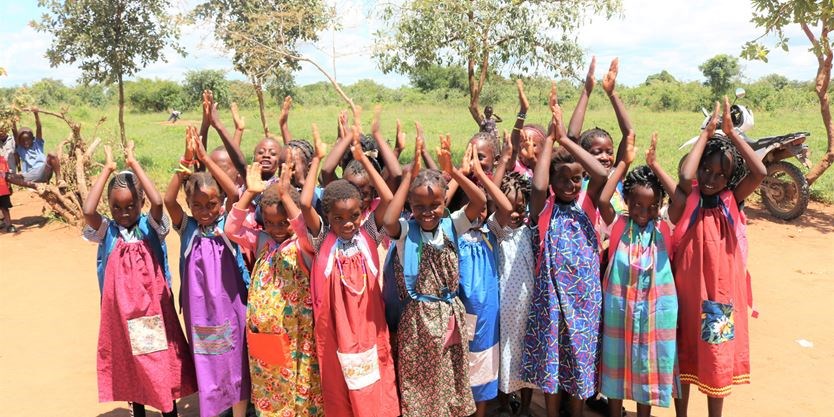
There could be a few kids walking around a rural village in Zambia sporting Muskoka shirts now.
Rotarians and volunteers from Muskoka, Parry Sound, North Bay and Toronto formed an 18-member humanitarian delegation to help build classrooms and interact with students roughly 17 kilometres outside Lusaka, the capital of Zambia, as part of Rotarians Enhancing Learning of African Youth, or RELAY, from March 2 to 17.
“It’s really about trying to improve the life of children in Africa, in particular through their schools and learning environments,” said Michael Duben, co-founder and co-team leader of the project with his wife, Shelly.
Both are members of the Rotary Club of Bracebridge-Muskoka Lakes (Ontario, Canada – D 7010).
Duben has visited Africa 14 times and participated in nine RELAY projects.
The latest delegation brought 750 pounds of supplies to the formerly one-classroom school, including backpacks, size-adjustable shoes and dresses or Muskoka-logo shirts for each of the 180 students.
But the delegation was not alone. While the visitors brought project funding, professional expertise and manual labour to Zambia, Rotarians from Lusaka acted as project managers.
The local Rotarians as project managers secured approvals, created work schedules, supervised the contractor and purchasing supplies, and collaborated with Zambia Open Community Schools, which identifies rural communities underserviced by government schools and works with villages to create community schools for accessible and sustainable education.
And the Roger Federer Foundation provided additional financial support.
The school, noted Duben, was not government run.
“It fills in the gaps between government schools,” he said.
“For some of the small villages, the children are too far from the closest government school to make schooling a reality for them.”
Two teachers managed the school by dividing the 180 students in morning and afternoon classes and then splitting those classes into two groups — one that would learn under a tree outside and another that would squeeze into the small classroom.
Duben said delegation members spent a lot of time onsite helping with construction, such as completing concrete work, digging latrines, painting rebar for roof trusses, painting interior and exterior walls, assembling desks, installing windows and planting trees.
Their work helped expand the school to four classrooms by the end of the project.
Participants also interacted with the students through photography, arts and crafts, outdoor games and more.
Duben said it was clear the project made a difference for the village.
“There were parents enrolling their kids in the school while we were there,” he said.
“So we know that by improving the learning environment, not only are kids being taught in a better environment, but there are also more kids being taught because now, suddenly, the school has more to offer and parents want to be a part of it.”
Work had not stopped since the delegation came home.
Duben noted the project continued to provide mosquito nets as malaria prevention to families that attended the school.
And the project would fund submersible solar pumps and water filters so teachers, students and parents could access groundwater for drinking and hygiene, despite not having electricity in the area.
He agreed the project was just one example of the work Rotarians, as service club members, did both at home and abroad to help those in need.
“Some Rotarians choose to focus on their own backyard and there is no doubt there is a need for that. Some choose to focus on international projects,” he said.
“But all of us adhere to the idea of service above self. We help people somewhere because people need help everywhere.”
Rotary noted international projects were a way to enhance international understanding and peace.
And how did the project affect those who travelled to Zambia?
“I think it impacts everybody differently,” said Duben.
“I’ve heard from a few people that not a day goes by they don’t think about something that happened in Zambia.”
He noted that, for him, the projects offer him perspective.
“You can’t get too uptight about someone getting your order wrong at Tim Hortons or a lineup or somebody cutting you off on the road. You realise how much we have,” he said.
“And when you come from an environment where people are so thankful for what little they have, it forces you to be introspective and more appreciative.”
Source: muskokaregion.com





